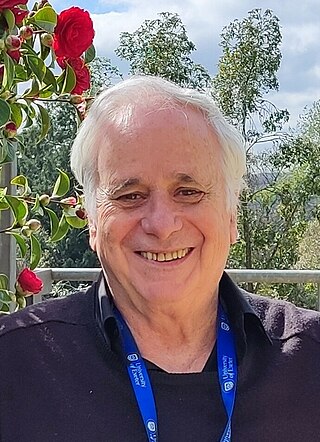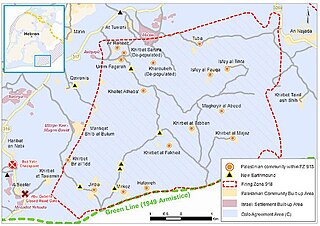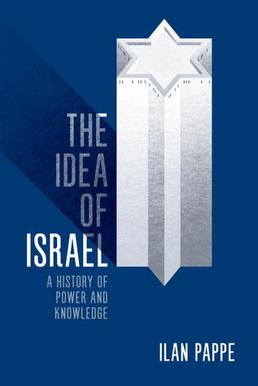Related Research Articles

Benny Morris is an Israeli historian. He was a professor of history in the Middle East Studies department of Ben-Gurion University of the Negev in the city of Beersheba, Israel. Morris was initially associated with the group of Israeli historians known as the "New Historians", a term he coined to describe himself and historians Avi Shlaim, Ilan Pappé and Simha Flapan.

Ilan Pappé is an Israeli historian, political scientist, and former politician. He is a professor with the College of Social Sciences and International Studies at the University of Exeter in the United Kingdom, director of the university's European Centre for Palestine Studies, and co-director of the Exeter Centre for Ethno-Political Studies. Pappé was also a board member of the Israeli political party Hadash, and was a candidate on the party list in the 1996 and 1999 Israeli legislative elections.

Joseph Andoni Massad is a Jordanian academic specializing in Middle Eastern studies, who serves as Professor of Modern Arab Politics and Intellectual History in the Department of Middle Eastern, South Asian, and African Studies at Columbia University. His academic work has focused on Palestinian, Jordanian, and Israeli nationalism.
Ella Habiba Shohat is an Iraqi-born Israeli-American professor of cultural studies at New York University, where she teaches in the departments of Art & Public Policy and Middle Eastern & Islamic Studies. She has written and lectured on the topics of Eurocentrism, orientalism, post-colonialism, trans-nationalism, diasporic cultures, and Iraqi-Jewish culture.
This is an incomplete bibliography of the Arab–Israeli conflict.

The Tantura massacre took place on the night of 22/23 May 1948 during the 1948 Arab–Israeli War, when Palestinian villagers were massacred by the Alexandroni Brigade of the Haganah. The massacre occurred after the surrender of the village of Tantura, a small village of roughly 1,500 people located near Haifa. The number of those killed is unknown, with estimates ranging from "dozens" to 200+.

Edward Wadie Said was a Palestinian-American academic, literary critic, and political activist. As a professor of literature at Columbia University, he was among the founders of post-colonial studies. As a cultural critic, Said is best known for his book Orientalism (1978), a foundational text which critiques the cultural representations that are the bases of Orientalism—how the Western world perceives the Orient. His model of textual analysis transformed the academic discourse of researchers in literary theory, literary criticism, and Middle Eastern studies.
In the 1948 Palestine war, more than 700,000 Palestinian Arabs – about half of Mandatory Palestine's predominantly Arab population – were expelled or fled from their homes, at first by Zionist paramilitaries, and after the establishment of Israel, by its military. The expulsion and flight was a central component of the fracturing, dispossession, and displacement of Palestinian society, known as the Nakba. Dozens of massacres targeting Arabs were conducted by Israeli military forces and between 400 and 600 Palestinian villages were destroyed. Village wells were poisoned in a biological warfare programme codenamed Operation Cast Thy Bread and properties were looted to prevent Palestinian refugees from returning. Other sites were subject to Hebraization of Palestinian place names.

Masafer Yatta is a collection of 19 Palestinian hamlets in the southern West Bank, in the Hebron Governorate of the State of Palestine, located between 14 and 24 kilometers south of the city of Hebron, in the southern Hebron Hills. The hamlets are situated within the municipal boundary of Yatta. The name "Masafer" is believed to derive from the Arabic words for "traveling," in light of the distance needed to travel from Yatta, or "nothing" in light of the local belief that "nothing" would be able to live in the area.

The Ethnic Cleansing of Palestine is a book authored by New Historian Ilan Pappé and published in 2006 by Oneworld Publications. The book is about the 1948 Palestinian expulsion and flight, which Pappe argues was the result of ethnic cleansing.

The Idea of Israel: A History of Power and Knowledge is a non-fiction book written by professor and historian Ilan Pappé about the Zionist ideology's role in Israeli education, media, and film. It was published in 2014 by Verso Books. The book discusses three periods in the effort to define Zionism: the classic Zionist account of the history of Israel; the emergence of the post-Zionism movement in the 1990s; and the rise of neo-Zionism, which Pappé argues is a highly nationalistic and racist ideology.

The Nakba is the ethnic cleansing of Palestinian Arabs through their violent displacement and dispossession of land, property, and belongings, along with the destruction of their society and the suppression of their culture, identity, political rights, and national aspirations. The term is used to describe the events of the 1948 Palestine war in Mandatory Palestine as well as the ongoing persecution and displacement of Palestinians by Israel. As a whole, it covers the fracturing of Palestinian society and the long-running rejection of the right of return for Palestinian refugees and their descendants.

Zionism has been described by several scholars as a form of settler colonialism in relation to the region of Palestine and the Israeli–Palestinian conflict. This paradigm has been applied to Zionism by various scholars and figures, including Patrick Wolfe, Edward Said, Ilan Pappe and Noam Chomsky. Zionism founders and early leaders were aware and unapologetic about their status as colonizers, Many early leading Zionists such as Ze'ev Jabotinsky in "The Iron Wall", described Zionism as colonization.
"Ongoing Nakba" is a historiographical framework and term that interprets the Palestinian "Nakba" or "catastrophe" as a still emerging and unfolding phenomenon. The phrase emerged in the late 1990s and its first public usage is widely credited to Hanan Ashrawi, who referred to it in a speech at the 2001 World Conference against Racism. The term was later adopted by scholars such as Joseph Massad and Elias Khoury. As an intellectual framework, the "ongoing Nakba" narrative reflects the conceptualisation of the Palestinian experience not as a series of isolated events, but as "a continuous experience of violence and dispossession", or as other have termed it, the "recurring loss" of the Palestinian people.
The Palestine Book Award is an annual literary award presented by Middle East Monitor. The award began in 2012 and aims to honor the best new books in English about any aspect of Palestine.

Ramzy Baroud is an American-Palestinian journalist and writer. He is the author of several books on the Israel-Palestinian conflict.
The Rise and Fall of a Palestinian Dynasty: The Husaynis, 1700–1948 is a 2010 history book written by Israeli historian Ilan Pappé and published by University of California Press. The book revolves around the Al-Husayni family of Jerusalem, which was a politically influential family in Palestine between the 18th and 20th century.

Palestine: A Socialist Introduction is a 2020 essay collection about the historical context of the Palestinian struggle for liberation and its relationship to socialism, edited by Sumaya Awad and brian bean.
The Association for the Defense of the Rights of the Internally Displaced (ADRID) (Arabic: جمعية الدفاع عن حقوق المهجرين) is a non-governmental Palestinian organization in Israel that focuses on defending the right of internally displaced Palestinians, often known as "present absentees," to return to their lands and their homes.
References
- ↑ Hamdi, Tahrir (2022-12-15). Imagining Palestine: Cultures of Exile and National Identity. Bloomsbury Academic. ISBN 978-1-78831-340-7.
- ↑ "Imagining Palestine: Cultures of Exile and National Identity". Palestine Book Awards. Retrieved 2024-08-27.
- ↑ Butt, Usman (29 October 2023). "Imagining Palestine: Cultures of Exile and National Identity". Middle East Monitor.
- ↑ Pappé, Ilan (2023-08-07). "Ilan Pappé on Tahrir Hamdi's Imagining Palestine". The Markaz Review. Retrieved 2024-08-27.
- ↑ Blend, Benay (2023-01-03). "Imagining Palestine: Cultures of Exile and National Identity - Book Review". Palestine Chronicle. Retrieved 2024-08-27.
- ↑ Moore, Lindsey (October 2023). "Tahrir Hamdi, Imagining Palestine: Cultures of Exile and National Identity". Journal of Holy Land and Palestine Studies. 22 (2): 258–260. doi:10.3366/hlps.2023.0318.